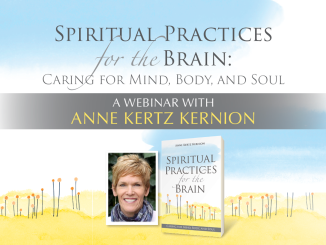
My wife and I recently took our spiritual pulse, using a brief assessment derived from Terry Hershey’s book, The Power of Pause: Becoming More by Doing Less.
I was happy with my results: I am “a powerful pauser” and know how to balance my priorities. Of course, finding this balance has required me to make some difficult decisions. For example, earlier this year I recognized that I had overcommitted myself. Teaching a ninth-grade class full-time would have easily overwhelmed me, so I have taken a break. However, I have been able to contribute to the faith formation program in ways that don’t require as much of a time commitment.
My wife, however, was disappointed with her results—she needs to push the pause button now! She is constantly tired and overcommitted, and she needs to take time to pause and recharge.
“Great,” she scoffed after reading the results. “One more thing to add to my to-do list.”
She made a great point. Sometimes, pressing pause becomes just another thing that we have to fit in with every other errand, task, or commitment. Instead of being an opportunity to rest, recharge, and refocus, pausing itself becomes a source of stress.
Perhaps thinking of pausing in another way will help: it’s not something we do, but a way we approach, receive, and respond to the stressors in our life. With this new perspective, we can “pause without pausing” by following three simple steps.
- Be objective about the stressor. When you experience stress, objectively describe what it is that is stressing you out and how you feel about it. Name it by saying it out loud or writing it in a journal. Describe how you feel that stress in your body. Omit any value-laden adjectives such as good or bad. For example, I had to prepare a lesson for the OCIA, and as the week passed, I realized the day before that I had not even begun to prepare. I named the stressor without judgment and how I felt about it: “I have to prepare a lesson for tomorrow, and I’m afraid I won’t have enough time to do it.”
- Remember that the stressor will pass. Whenever I was worried as a kid, my grandma would say to me, “Now, Bobby, remember: this too shall pass.” I appreciate her words of wisdom more now than when I was a child. Nothing in this world lasts forever, even the things that stress us. By naming the stress objectively, we identify it as a passing phenomenon. Yes, it may have a powerful pull on us, but it is only temporary. One way to let the stress pass (or at least weaken its hold on us) is to relax that part of the body where we feel the stress. In my above RCIA example, I noticed that upon naming the stress, I felt a tightness in my neck and shoulders. As I relaxed them, I seemed to lessen the hold that the stress of preparing the lesson had on me. This was liberating.
- Focus on what brings you joy. Freed (even just a little) of the stress, we now have the space to turn our attention to what really matters: joy. As Christians, and especially as catechists, we are called to bring the joy of the Gospel to the world. How can we do that if we are not ourselves joyful? I take a moment and redirect my attention from what stresses me to what brings me joy and how I can share that joy with others. Joy is, after all, a fruit of the Holy Spirit; by bringing joy into the world, we will recognize the Holy Spirit’s work in us. Finishing my example, I remembered the joy I feel among the people in the RCIA class. We have formed a small faith-sharing community, and that is what really matters, not what I have to say about any particular topic.
The reality is that taking time to pause can be a real challenge and become stressful in and of itself, if we take the wrong approach. But pausing does not have to mean carving out a large block of time to sit in silence and pray and meditate. Take moments as they come, and remember that pausing is about discovering the freedom where we can find God in all things.





Be the first to comment